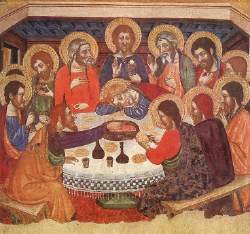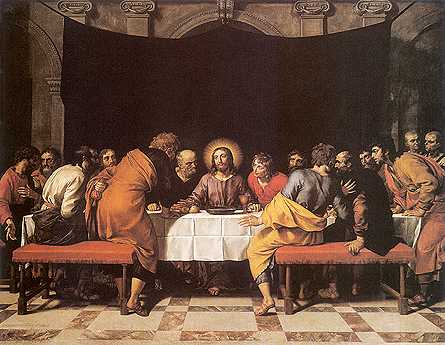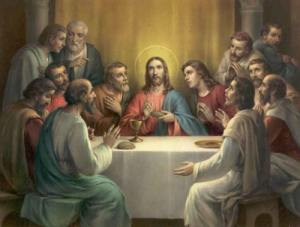I give you a new commandment… . As I have loved you, so you also should love one another. (John 13:34)
They say couples who have been married a long time start to look alike. Whether or not it’s true physically, it probably is true that a loving married couple over the years starts to think alike. They share the same desires and goals. They tend to make similar choices. They even complete each other’s sentences!
Well, if this is true of the relationship between a husband and wife, it is most certainly true when it comes to our relationship with Jesus. After all, the Church is the bride of Christ. That means that as his beloved, we should resemble him more and more every day.
But how do we do that? By loving other people as Jesus loves us.
This is a new commandment! We all have heard the greatest commandment telling us to love our neighbor as we love ourselves. But Jesus took this even further as he spoke to his disciples on the night before he died. He wants us to love as he loves. This is what will set us apart as his people, his bride. This is what will make us start to look like him: loving like him!
If you want to know what Jesus’ love looks like, make a list! Think about various Scripture passages that have touched your heart. Think, too, about your personal experiences of the Lord. Write down words that describe what these felt like. Is his love generous? Forgiving? Compassionate? Is it faithful? Trustworthy? Pure?
Next, thank Jesus for the way he loves you, and ask him to put that same love in your heart. Make it a point to take just one of the descriptions on your list and live it out today. This is what will set you apart as a member of the bride of Christ.
“Jesus, pierce my heart with the love you have for me. Come, Lord, and expand my love so that I can pour it out to others. I want to become your reflection in this world!”
Acts 14:21-27; Psalm 145:8-13; Revelation 21:1-5
1. In the first reading, Paul and Barnabas prayed and fasted for those who were chosen to be leaders in the Church. Are you willing to pray and fast for the leaders of the Church and your parish? What concrete steps can you take to better support your pastor and his work?
2. The responsorial psalm sings of the graciousness, mercy, and kindness of God. Share the ways in which you have personally experienced these wonderful graces in your life. What are the ways in which you demonstrate your appreciation to God for his graciousness, mercy, and kindness?
3. In the second reading, St. John tells us that the “old order has passed away” and God is making “all things new”. What steps can you take to allow God to replace old patterns of behavior with “new” patterns?
4. In the Gospel reading, we are told that “all will know you are my disciples, if you have love one for another” (John 13:35). What do you think these words mean? Why is “love” the identifying characteristic of what it means to be a Christian? Who are the people in your parish, or at your workplace, to whom you need to show more love?
5. In the meditation, we hear these words, “We all have heard the greatest commandment telling us to love our neighbor as we love ourselves. But Jesus took this even further as he spoke to his disciples on the night before he died. He wants us to love as he loves.” In what way does Jesus’ “new commandment” to love one another as he has loved us raise the commandment to “love your neighbor as yourself” to an even higher level. Why is this commandment impossible to fulfill unless we have first experienced Jesus’ love for us? (1 John 4:19: “We love because he first loved us.”)
6. Take some time now to pray and ask the Lord to give you a greater experience of his great love for you, so you can give it away to others. Use the prayer at the end of the meditation as a starting point.



 The Gospel is from John 13:31-33a, 34-35.We are disciples, followers of Christ, but how many of us would pass the test that Christ himself lays down for deciding who are his true followers? The word "charity" unfortunately has come to have a very restricted meaning in our present-day vocabulary. It signifies giving an alms, a gift of money to a needy person. This is but a very small part of the true charity, true love of neighbor which Christ made the distinguishing mark of the true Christian. He who truly loves his neighbor must be interested, first and foremost, in those things which concern that neighbor's most important purpose in life, his eternal salvation.
The Gospel is from John 13:31-33a, 34-35.We are disciples, followers of Christ, but how many of us would pass the test that Christ himself lays down for deciding who are his true followers? The word "charity" unfortunately has come to have a very restricted meaning in our present-day vocabulary. It signifies giving an alms, a gift of money to a needy person. This is but a very small part of the true charity, true love of neighbor which Christ made the distinguishing mark of the true Christian. He who truly loves his neighbor must be interested, first and foremost, in those things which concern that neighbor's most important purpose in life, his eternal salvation. 







 Pray for an end to abortion in the United States.
Pray for an end to abortion in the United States. 

